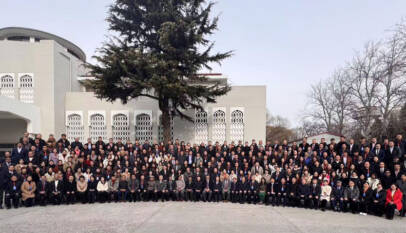Pakistan, China collaborate for newer cotton seed varieties
Under joint collaboration between Pakistan and China, Pakistan’s cotton industry is boosting as new seed varieties are being introduced. As Pakistan has been struggling with low cotton production for a few years now, there is a need for developing high-quality cotton seed that can withstand climate change. For this reason, Central Cotton Research Institute in Multan has said that it will cooperate with the Fauji Fertilizer Company, and introduce newer seed varieties.
ISLAMABAD,Sep.26(Gwadar Pro) – Last season, Pakistan harvested 5.6 million bales of cotton, which is the lowest point in the past 30 years.
Meanwhile, Pak-China cotton-related cooperation is in full swing. “We are mixing the advantages of China cotton and Pakistan cotton to create new cotton varieties,” said Shahid Iqbal, Ph.D. scholar of Cotton Research Institute in Henan, China, who has been working for a Pak-China cottonseed program in Henan for 4 years. This is one of the microcosms of the ongoing China-Pakistan cotton collaboration.
The dilemma of Pakistan cotton
“Last year, we had to import more than 50% of cotton,” said Muhammad Abdullah, executive director of Sapphire Fiber, one of the largest textile companies in Pakistan. He complained that low production and quality force the local industry to choose imports. “Presently, the domestic consumption of cotton is 14 million bales. However, Pakistan harvested 5.6 million bales of cotton in the last season only.” He added.
Cotton production in Pakistan is in a vicious circle. According to the research of Central Cotton Research Institute (CCRI), low production of cotton lead to the low profitability of cotton planting. Cotton farmers turn to grow sugarcane in cotton-growing areas for better income. Sugarcane plants robbed water from cotton plants and humidified the whole area. The high humidity leads to more insects which are deadly to the cotton plants and farmers have no technology to deal with them.
What makes it worse is the climate change in the past few years, which is also weakening cotton’s strength and staple elongation. Another quality problem is the impurity which is caused by 100% manual picking. As pickers picked the cotton, stored and transported it, contamination is entering in the cotton, which may causes spots on the final product.. Kamran Razaq, cotton field supervisor of Sapphire Fiber pointed out that the impurity content of imported cotton is 4.5%, while the counterpart in Pakistan cotton is 8-9%, which is below the criteria of the textile mills.
Pak-China cooperation to alleviate the harsh situation
To break the vicious circle of low cotton production, higher quality seed is the top demand, which can also help in quality improvement.
“ The heat resistance of Pakistani cotton is excellent. The high-yield and high-quality traits of Chinese cotton are also what Pakistan seeds need. The germplasm resources of China and Pakistan are complementary,” said Shahid Iqbal, the guy who appeared at the beginning of the article, who used to be a scientific officer of Cotton Research Institute in Multan. “ We have a plan to send new cotton seeds to Pakistan next year for adaptability test and select the best ones and use them for production..”
Xinjiang Agricultural University and University of Agriculture Faisalabad ( UAF ) have also been cooperating in cotton cultivation for a few years. They have experimental fields in Faisalabad and plans to test mechanical picking in Pakistan. “In North Xinjiang, one of the biggest cotton areas in China, the mechanization is 90%. We use machine picking everywhere,” said Chen Quanjia, deputy dean of Xinjiang Agricultural University, adding that drought-resistant and water-saving technologies in Xinjiang including drip irrigation and mulching are also leading the world. “Such technologies and equipment can be transferred to Pakistan to assist them coping with the current dilemma. China and Pakistan need to assist each other to improve our cotton production together.”
Dr. Muhammad Ali Talpur, vice president of Pakistan Central Cotton Committee (PCCC), revealed that a modern biotechnology center of excellence laboratory is about to be set up at CCRI to promote cotton research activities.“China Pakistan Economic Corridor(CPEC) is opening new avenues for cotton research and development to solidify PCCC on modern scientific lines.” He said.
“Under CPEC, CCRI in Multan had declared a cottonseed cooperation collaborating with Fauji Fertilizer Company,” added Dr. Zahid Mehmood, director of CCRI. “We plan to cultivate related talent, introduce related technology and arrange areas for mechanical cotton picking. Our collaboration with China is going on. Hope we have stories of success in the future.”
Pakistan’s capital market delegation visits China, signs MoUs
Karachi – A high-level delegation from Pakistan’s capital market, led by Mr Akif S…













